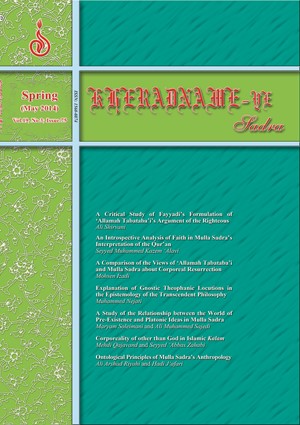-
-
List of Articles
-
Open Access Article
1 - سرمقاله
Seyyed Mohammad Khamenei -
Open Access Article
2 - A Critical Study of Fayyadi’s Formulation of ‘Allamah Tabataba’i’s Argument of the Righteous
Ali Shirvani -
Open Access Article
3 - An Introspective Analysis of Faith in Mulla Sadra’s Interpretation of the Qur’an
Seyyed Muhammed Kazem ‘Alavi -
Open Access Article
4 - A Comparison of the Views of ‘Allamah Tabataba’i and Mulla Sadra about Corporeal Resurrection
Mohsen Izadi -
Open Access Article
5 - Explanation of Gnostic Theophanic Locutions in the Epistemology of the Transcendent Philosophy
Mohammad Nejati -
Open Access Article
6 - A Study of the Relationship between the World of Pre-Existence and Platonic Ideas in Mulla Sadra
Ali Muhammed Sajedi -
Open Access Article
7 - Corporeality of other than God in Islamic Kalam
Mehdi Qajavand -
Open Access Article
8 - Ontological Principles of Mulla Sadra’s Anthropology
Ali Arshad Riahi Hadi J‘afari
-
The rights to this website are owned by the Raimag Press Management System.
Copyright © 2017-2026







